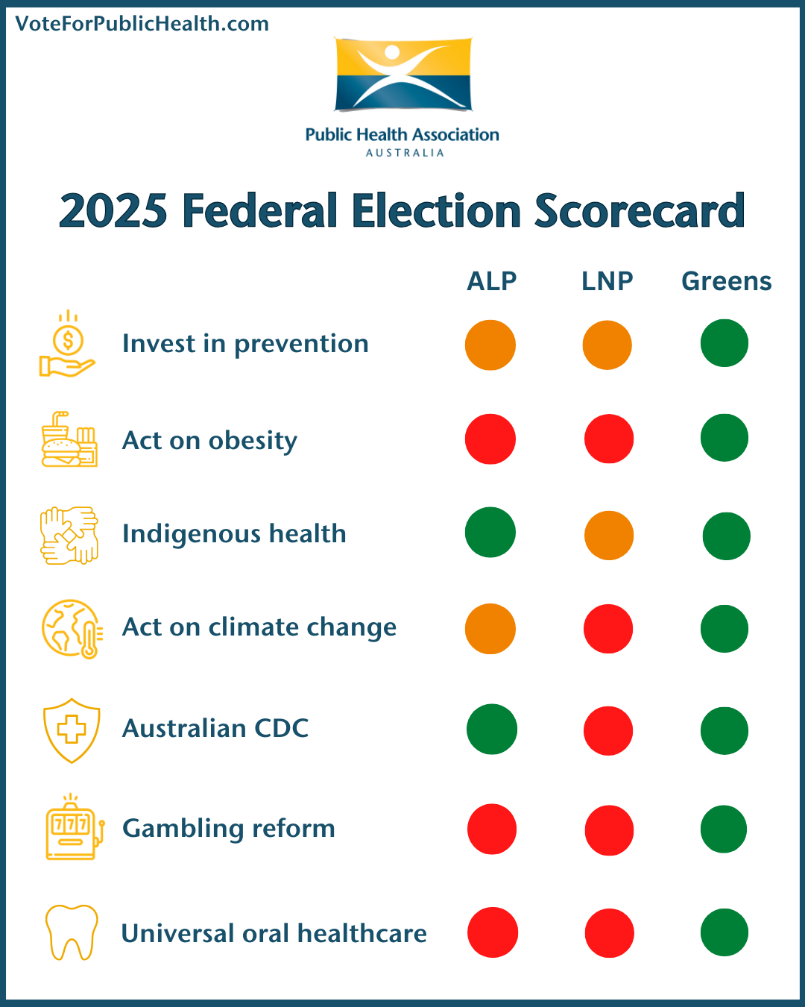Experts are urging Federal Election candidates to broaden their focus on health to include initiatives that will keep Australians well and out of hospitals, after new analysis showed that public health is largely absent from the election commitments made by the two major political parties.
The Public Health Association of Australia published its Election Scorecard today, rating the commitments made by the Australian Labor Party, Liberal National Party Coalition, and the Greens against seven priorities put forward by public health experts.
While the Greens scored seven 'green lights' for their commitments to increasing investment in prevention, action on obesity, Aboriginal and Torres Strait Islander health, climate and health, gambling reform, oral health care and establishing a permanent Centre for Disease Control, the ALP only received two green lights, and the Coalition none.
The Coalition also indicated in their response to the election asks that they did not believe there was a case for an independent Australian Centre for Disease Control. Establishing an Australian CDC was recommended by the COVID-19 response inquiry, as well as public health and infectious disease groups. This is the first time the Coalition has clarified their position on making the Centre permanent.
Adjunct Professor Terry Slevin, CEO, Public Health Association of Australia, says that while both major political parties have made significant health promises, the election campaign is missing the mark when it comes to Australians' health.
"This election campaign has set health up as a battleground, with Labor making at least nine health announcements in the last six months, worth billions of dollars, that show their commitment to investing in health treatment and hospitals. The Liberal National Coalition have been quick to match these, while making their own commitments to youth mental health.
"Our Election Scorecard shows that there is one clear difference between the two parties when it comes to their position on plans for Australia's Centre for Disease Control.
"But what neither party seems to be talking about is how we are going to reduce the pressure on the health system and keep more Australians out of our already strained hospitals and doctors' waiting rooms.
"National expenditure on health is growing rapidly and now sits at around $250 billion a year – but alarmingly, only around three percent of that spending goes to initiatives that are going to stop Australians from getting sick in the first place.
"It's not just a health failure; it's an economic fiasco. Both parties are keen to establish themselves as good financial managers, but failure to invest in prevention will render our national health budget financially unsustainable.
"What we are really hoping to see in the coming weeks is some of our political candidates step up and provide a longer-term vision of what they are going to do to keep Australians healthy. We want to protect our young people so that they can live healthy and happy lives, and support our aging population to enjoy as many years in good health as possible. This will also relieve our health system and our economy.
"There are many cost-effective policies that the next Government could adopt to create a legacy that puts Australians on a path to good health."
The Public Health Association of Australia is calling for the next Federal Government to: • Establish a permanent Australian Centre for Disease Control • Invest in prevention to save lives • Act on obesity to help more Australians maintain a healthy weight • Invest in First Nations people's health to close the gap • Protect our health by acting on climate change • Reform gambling so people lose less • Introduce universal oral health care through Medicare







